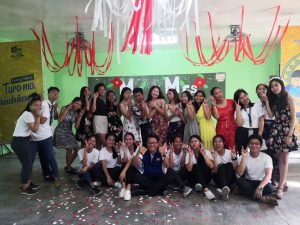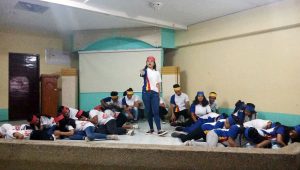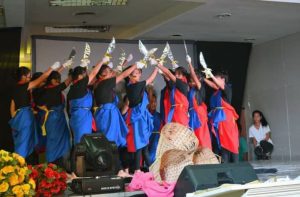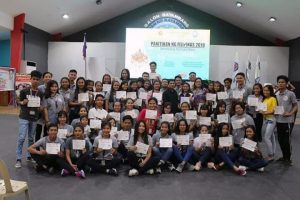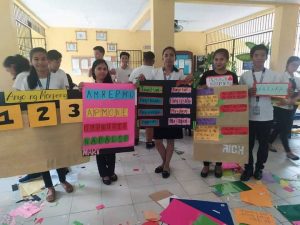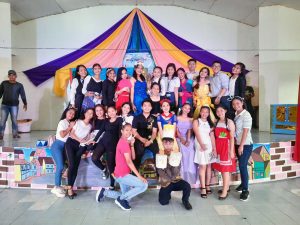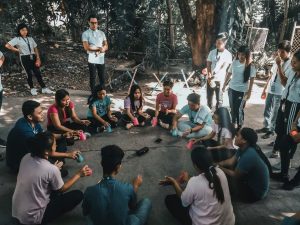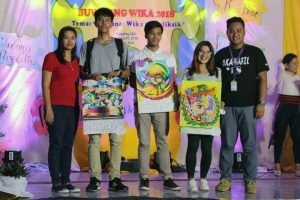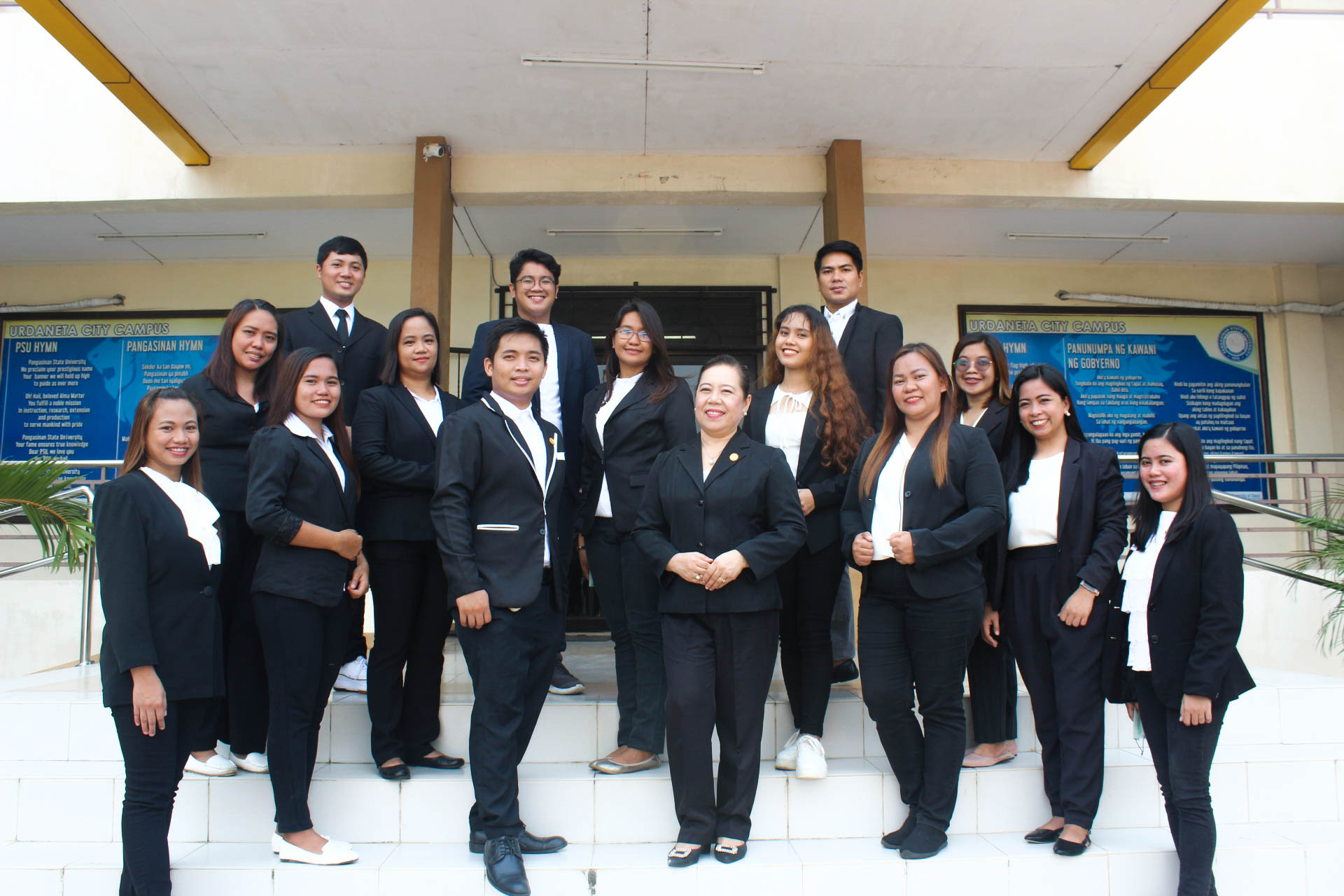
Welcome to Bachelor of Science in Education-Filipino. It is a delight to give you a glimpse of the department and what it has accomplished.
Guided by the vision and mission of the University, the BSEd Department is bent on providing the best quality of education to students who dream of becoming professional educators someday.
As you explore the website, you’ll learn that the Department is home to highly qualified educators honed by time and experience. Cognizant of their weighty responsibility as teachers, they continue to equip themselves with up-to-date information relevant to their specialization with the goal of producing competitive graduates.
Since the inception of the program in 2015 up to 2019, the department consistently surpassed the National Passing Rate. The performance in the Licensure Examinations for Professional Teachers bespeaks well about the quality of instruction the faculty provides to their students. In particular, the department produced one 4th placer in 2016 LET exam.
The BSEd faculty members are committed, more than ever, to give their best despite the challenges brought by the pandemic. They are steadfast and resolute in making the program one of the best in Urdaneta Campus by complying with the standards set by the accrediting agencies.
Accreditation Status: AACCUP LEVEL II Re-accredited
Organizational Chart
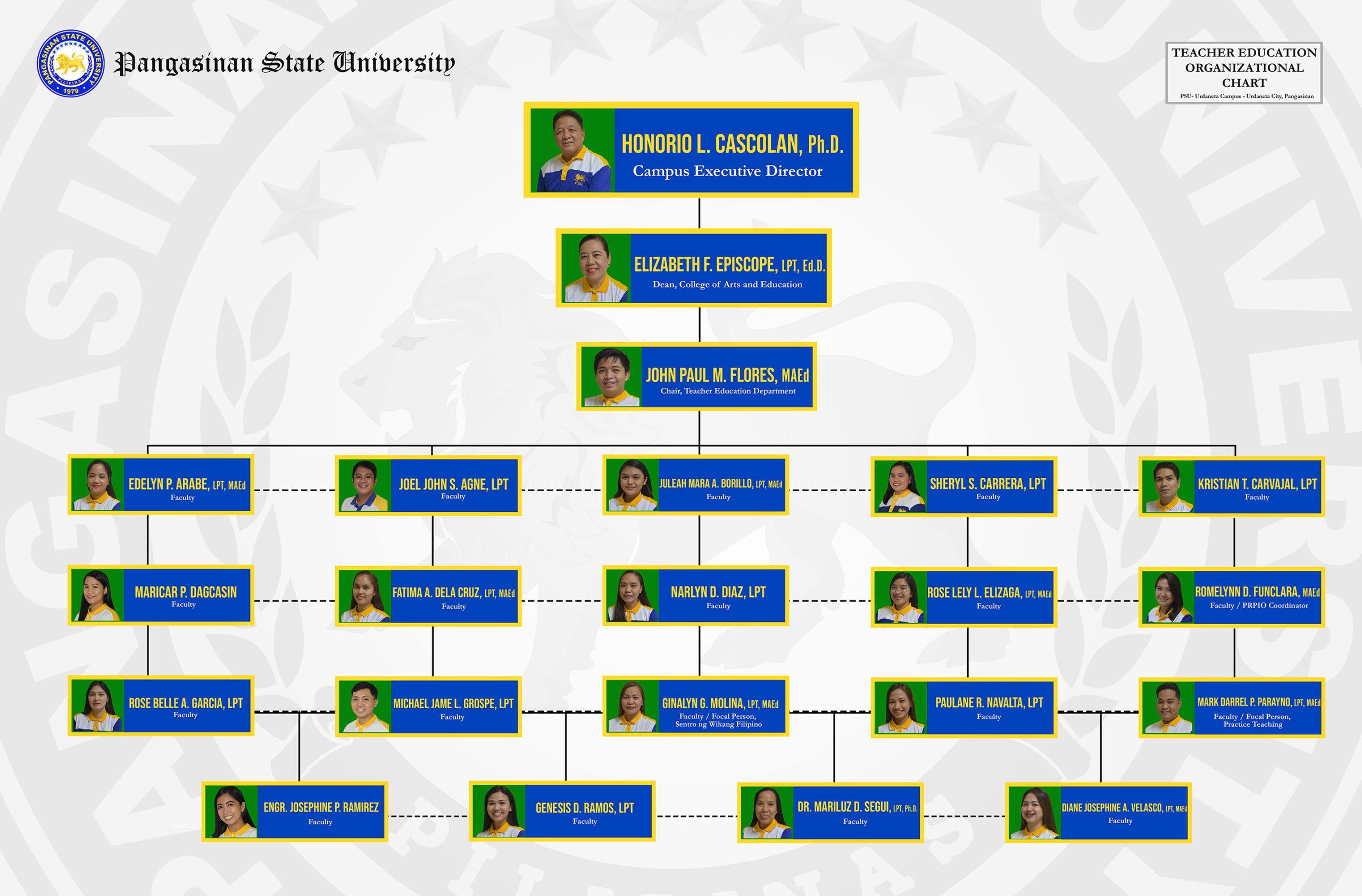
EMPLOYMENT OPPORTUNITIES
- Education Administrators
- Secondary Education Teacher
- Special Education Teacher
- Postsecondary Teacher
- Secondary School Teacher
- Principal
- High School Teacher
- Science Teacher
- Filipino Teacher
- Human Resource Specialist
- Education Coordinator
- Private School Teacher
The BSED degree program aims to develop highly motivated and competent teachers specializing in the content and pedagogy for secondary education
Institutional Learning Outcomes (ILO)
- Demonstrate through institutional mechanisms, systems, policies, and processes which are reflective of transparency, equity, participatory decision making, and accountability.
- Engage in relevant, comprehensive, and sustainable development initiatives through multiple perspectives in decisions and actions that build personal and professional credibility and integrity.
- Set challenging goals and tasks with determination and sense of urgency which provide continuous improvement and producing quality outputs leading to inclusive growth.
- Exhibit life-long learning and global competency proficiency in communication skills, inter/interpersonal skills, entrepreneurial skills, innovative mindset, research and production initiatives and capability in meeting the industry requirements of local, ASEAN and international human capital market through relevant and comprehensive programs.
- Display, socially and environmentally responsive organizational culture, which ensures higher productivity among the university constituents and elevate the welfare of the multi-sectoral communities.
- Practice spiritual values and morally upright behavior which promote and inspire greater harmony to project a credible public image.
Common to All Programs in All Types of School (CTS)
- Articulate and discuss the latest developments in the specific field of practice (PQF Level 6 Descriptor).
- Effectively communicate orally and in writing using Mother Tongue, English and Filipino.
- Work effectively and independently in multi-disciplinary and multi-cultural teams (PQF Level 6 Descriptor).
- Act in recognition of professional, social, and ethical responsibility.
- Preserve and promote “Filipino historical and cultural heritage” (based on RA 7722).
Common to the Discipline (CD)
- Articulate the rootedness of education in philosophical, socio-cultural, historical, psychological, and political contexts.
- Demonstrate mastery of subject matter/discipline.
- Facilitate learning using a wide range of teaching methodologies and delivery modes appropriate to specific learners and their environments.
- Develop innovative curricula, instructional plans, teaching approaches, and resources for diverse learners.
- Apply skills in the development and utilization of ICT to promote quality, relevant, and sustainable educational practices.
- Demonstrate a variety of thinking skills in planning, monitoring, assessing, and reporting learning processes and outcomes.
- Practice professional and ethical teaching standards sensitive to the changing local, national, and global realities.
- Pursue lifelong learning for personal and professional growth through varied experiential and field-based opportunities.
Specific to a Sub-Discipline and a Major (SM)
- Demonstrate deep understanding of scientific concepts and principles.
- Apply scientific inquiry in teaching and learning.
- Utilize effective science teaching and assessment methods.
- Manifest meaningful and comprehensive pedagogical content knowledge (PCK) of the sciences.
Common to Graduates of a Horizontal Type of Institution as Defined in CMO 46, S 2012 (CHT)
- Contribute to the generation of new knowledge by participating in various research and development projects.
|
Program Outcomes |
Performance Indicator |
|
Display, socially and environmentally responsive organizational culture, which ensures higher productivity among the university constituents and elevate the welfare of the multi-sectoral communities. (PO 5) Demonstrate mastery of subject matter/discipline. (PO 13) Demonstrate deep understanding of scientific concepts and principles. (PO 20) |
Display basic and comprehensive understanding of knowledge, principles of the subject matter in the sciences. |
|
Demonstrate mastery of subject matter/discipline. (PO 13) Apply scientific inquiry in teaching and learning. (PO 21) |
Apply the scientific principles in problem solving current problems. |
|
Effectively communicate orally and in writing using both Mother Tongue and English and Filipino. (PO 8) Apply scientific inquiry in teaching and learning. (PO 21) |
Use scientific inquiry in understanding and explaining natural phenomena. |
|
Facilitate learning using a wide range of teaching methodologies and delivery modes appropriate to specific learners and their environments. (PO 14) Develop innovative curricula, instructional plans, teaching approaches, and resources for diverse learners. (PO 15) Utilize effective science teaching and assessment methods. (PO 22) |
Design and utilizes appropriate instructional materials in science. |
|
Work effectively and independently in multi-disciplinary and multi-cultural teams. (PO 9) Utilize effective science teaching and assessment methods. (PO 22) |
Employ effective teaching techniques for diverse types of learners in varied learning conditions. |
|
Set challenging goals and tasks with determination and sense of urgency which provide continuous improvement and producing quality outputs leading to inclusive growth. (PO 3) Demonstrate a variety of thinking skills in planning, monitoring, assessing, and reporting learning processes and outcomes. (PO 17) Utilize effective science teaching and assessment methods. (PO 22) |
Design and utilizes a variety of appropriate assessment techniques to monitor and evaluate learning. |
|
Demonstrate a variety of thinking skills in planning, monitoring, assessing, and reporting learning processes and outcomes. (PO 17) Utilize effective science teaching and assessment methods. (PO 22) |
Provide regular feedback to students. |
|
Exhibit life-long learning and global competence proficiency in communication skills, intra/interpersonal skills, entrepreneurial skills, innovative mindset, research and production initiatives and capability in meeting industry requirements of local, ASEAN and international human capital market through relevant and comprehensive programs. (PO 4) Facilitate learning using a wide range of teaching methodologies and delivery modes appropriate to specific learners and their environments. (PO 14) Manifest meaningful and comprehensive pedagogical content knowledge (PCK) of the sciences. (PO 23) |
Utilize appropriate pedagogy and use of technology for the different science content areas. |
|
Articulate and discuss the latest developments in the specific field of practice (PQF Level 6 Descriptor). (PO 7) Facilitate learning using a wide range of teaching methodologies and delivery modes appropriate to specific learners and their environments. (PO 14) Manifest meaningful and comprehensive pedagogical content knowledge (PCK) of the sciences. (PO 23) Contribute to the generation of new knowledge by participating in various research and development projects. (PO 24) |
Demonstrate skills in various methods of teaching-learning in the sciences to include conducting science investigations, making models and prototype, and doing science research. |
|
Facilitate learning using a wide range of teaching methodologies and delivery modes appropriate to specific learners and their environments. (PO 14) Pursue lifelong learning for personal and professional growth through varied experiential and field-based opportunities. (PO 19) Manifest meaningful and comprehensive pedagogical content knowledge (PCK) of the sciences. (PO 23) |
Create and utilize learning experiences in the classroom to develop learner’s skills in discovery learning, problem learning and critical thinking. |
|
Demonstrate through institutional mechanisms, systems, policies, and processes which Pare reflective of transparency, equity, participatory decision making, and accountability. (PO 1) Engage in relevant, comprehensive, and sustainable development initiatives through multiple perspectives in decisions and actions that build personal and professional credibility and integrity. (PO 2) Practice spiritual values and morally upright behavior which promote and inspire greater harmony to project a credible public image. (PO 6) Act in recognition of professional, social, and ethical responsibility. (PO 10) Preserve and promote “Filipino historical and cultural heritage” (based on RA 7722). (PO 11) Articulate the rootedness of education in philosophical, socio-cultural, historical, psychological, and political contexts. (PO 12) Practice professional and ethical teaching standards sensitive to the changing local, national, and global realities. (PO 18) Pursue lifelong learning for personal and professional growth through varied experiential and field-based opportunities. (PO 19) |
Promote positive values, cultural heritage, ethical responsibility, and respect for dignity of individuals. |
The BSEd degree program aims to develop highly motivated and competent teachers specializing in the content and pedagogy for secondary education.
Institutional Learning Outcomes (ILO)
- Demonstrate through institutional mechanisms, systems, policies, and processes which are reflective of transparency, equity, participatory decision making, and accountability.
- Engage in relevant, comprehensive and sustainable development initiatives through multiple perspectives in decisions and actions that build personal and professional credibility and integrity.
- Set challenging goals and tasks with determination and sense of urgency which provide continuous improvement and producing quality outputs leading to inclusive growth;
- Exhibit life-long learning and global competency proficiency in communication skills, inter/interpersonal skills, entrepreneurial skills, innovative mindset, research and production initiatives and capability in meeting the industry requirements of local, ASEAN and international human capital market through relevant and comprehensive programs.
- Display, socially and environmentally responsive organizational culture, which ensures higher productivity among the university constituents and elevate the welfare of the multi-sectoral communities.
- Practice spiritual values and morally upright behavior which promote and inspire greater harmony to project a credible public image.
Common to All Program in All Types of School (CTS)
- Articulate and discuss the latest developments in the specific field of practice (PQF Level 6 Descriptor)
- Effectively communicate orally and in writing using both Mother Tongue, English and Filipino
- Work effectively and independently in multi-disciplinary and multi-cultural teams (PQF Level 6 Descriptor)
- Act in recognition of professional, social, and ethical responsibility.
- Preserve and promote “Filipino historical and cultural heritage”
Common to the Discipline (CD)
- Articulate the rootedness of education in philosophical, socio-cultural, historical, psychological, and political contexts.
- Demonstrate mastery of subject matter/discipline.
- Facilitate learning using a wide range of teaching methodologies and delivery modes appropriate to specific learners and their environments.
- Develop innovative curricula, instructional plans, teaching approaches, and resources for diverse learners.
- Apply skills in the development and utilization of ICT to promote quality, relevant, and sustainable educational practices.
- Demonstrate a variety of thinking skills in planning, monitoring, assessing, and reporting learning processes and outcomes.
- Practice professional and ethical teaching standards sensitive to the changing local, national, and global realities.
- Pursue lifelong learning for personal and professional growth through varied experiential and field-based opportunities.
Specific to a Sub-Discipline and a Major (SM)
- Nagpapamalas ng mataas na antas ng kaalaman sa pagtuturo ng wika at panitikang Filipino
- Nagpapakita ng malawak at malalim na pag-unawa at kaalaman sa ugnayan ng wika, kultura at lipunan
- Nakakagamit ng iba’t ibang kasanayan at kaalaman sa proseso ng pagtuturo-pagkatuto
- Nagtataglay ng kaalaman hinggil sa usapin ng kultural at lingguwistikong dibersidad ng bansa
- Nakapagdidisenyo ng malikhain, inobatibo, at integratibong mga alternatibong dulog sa pagtuturo at pagkatuto
- Nakakagagawa ng pananaliksik ukol sa ikauunlad ng wikang Filipino bilang wikang panturo
Common to Graduates of a Horizontal Type of Institution as Defined in CMO 46, S 2012 (CHT)
- Contribute to the generation of new knowledge by participating in various research and development projects.
Performance Indicators
|
Program Outcomes |
Performance Indicator |
|
Naipaliliwanag ang mga batayang kaalaman sa pagtuturo ng Filipino |
|
Nailalapat ang kaalaman sa Filipino na nakasalig sa iba’t ibang teorya, pananaw, at prinsipyo sa pagkatuto at pagtuturo |
|
Naipaliliwanag ang papel ng wika bilang isang panlipunang penomenon |
|
Nasusuri ang ugnayan ng wika, panitikan, kultura, at lipunan |
|
Nasusuri ang gamit ng wika sa iba’t ibang institusyong panlipunan |
|
Nakagagawa ng kritikal na pag-aaral hinggil sa mga napapanahong isyu sa wika, kultura, at lipunan at ang implikasyon nito sa pagtuturo at pagkatuto ng Filipino |
|
Nakapagdidisenyo ng makabuluhang kurikulum batay sa pagtuturo at pagkatuto ng Filipino |
|
Nakabubuo ng plano ng pagkatuto ayon sa kahingian ng kurikulum |
|
Nakalilikha ng mga kagamitang pampagtuturo na nakaugat sa lokal na kultura |
|
Nakagagamit ng mga makabagong pagdulog, pagtasa, at pagtaya sa pagtuturo at pagkatuto ng Filipino |
|
Nakagagamit ng iba’t ibang lapit o dulog sa pagtuturo ng Filipino para sa ika-21 siglo |
|
Natutukoy at nasusuri ang mga barayti at baryasyon ng wikang Filipino |
|
Napaghahambing ang mga pagkakatulad at pagkakaiba ng mga wika at kultura |
|
Nakapagpapahayag ng mga saloobin sa kahalagahan ng pagkakatulad at pagkakaiba ng mga rehiyonal na panitikan |
|
Nakagagamit ng iba’t ibang dulog sa pagtuturo at pagkatuto ng wika at panitikang Filipino |
|
Natataya ang bisa ng dulog sa epektibong pagtuturo-pagkatuto ng wika at panitikang Filipino |
|
Nakagagawa ng pananaliksik ukol sa wika at panitikang Filipino |
|
Nagtataglay ng kaalaman sa teknikal na aspeto ng pananaliksik sa pagtuturo at pagkatuto ng wika at panitikang Filipino |
|
Nakabubuo ng mga pag-aaral ukol sa pagtuturo at pagkatuto ng wikang Filipino |


